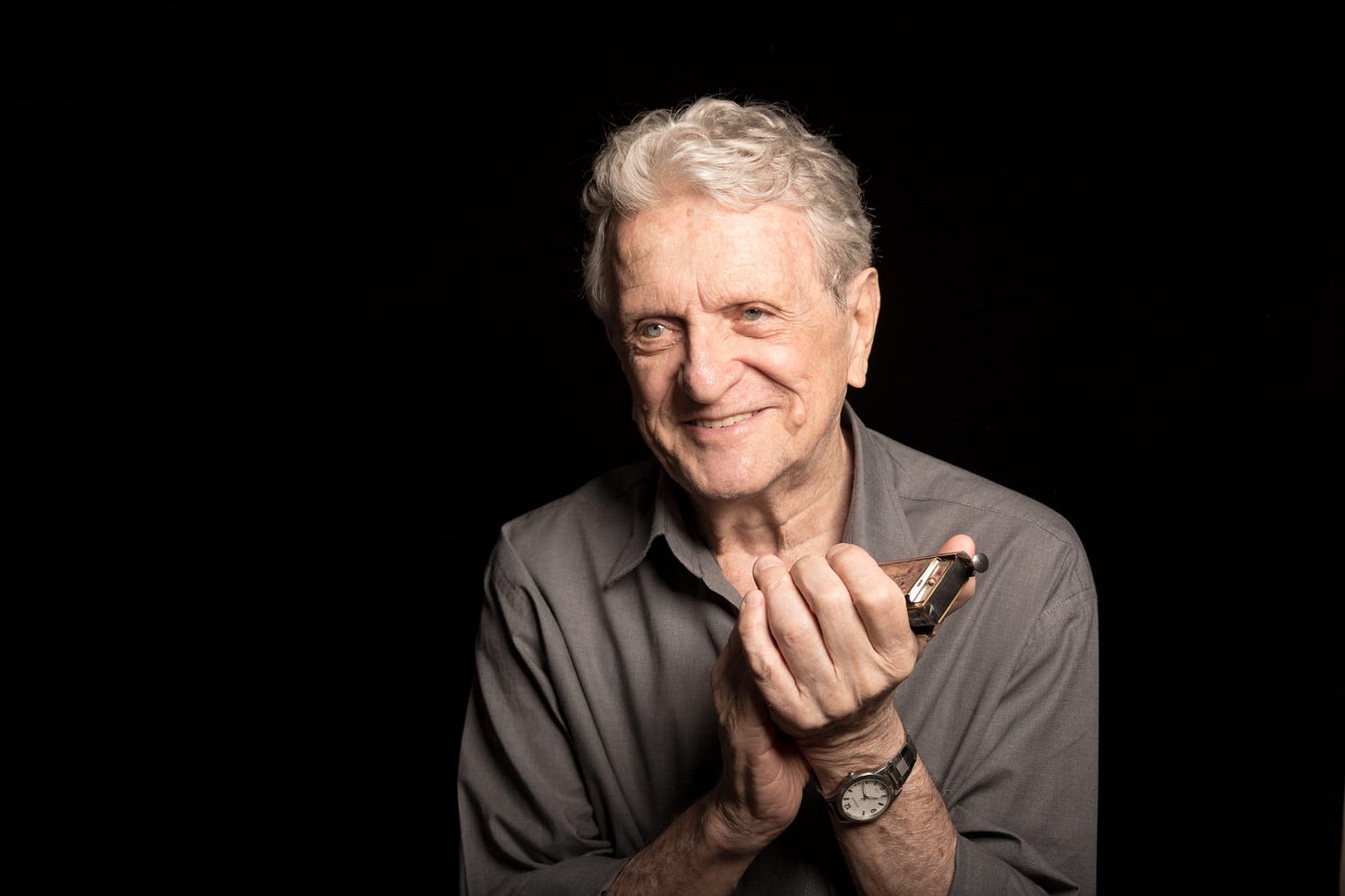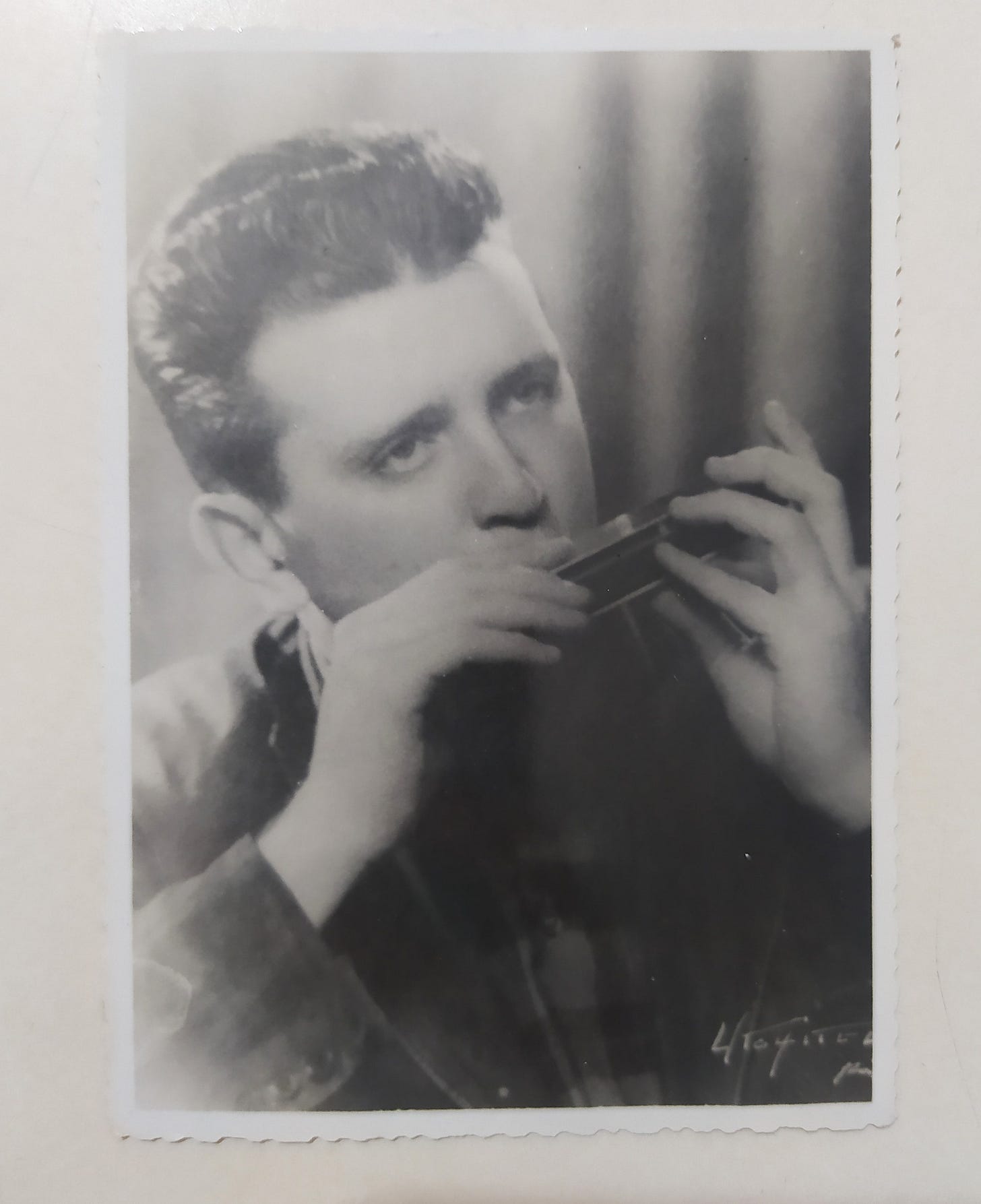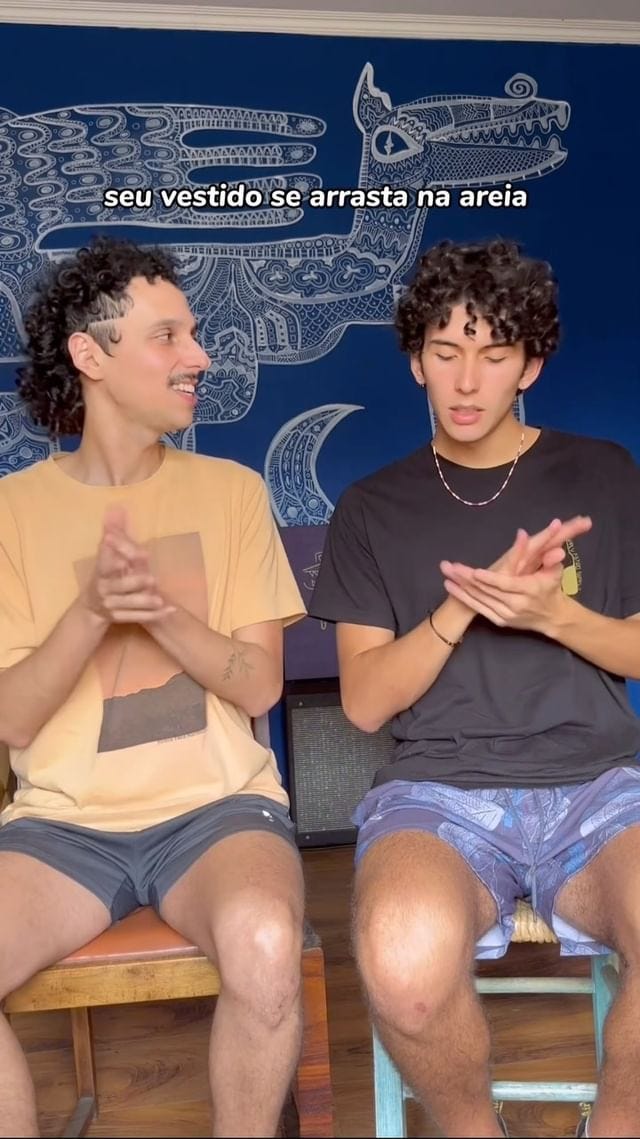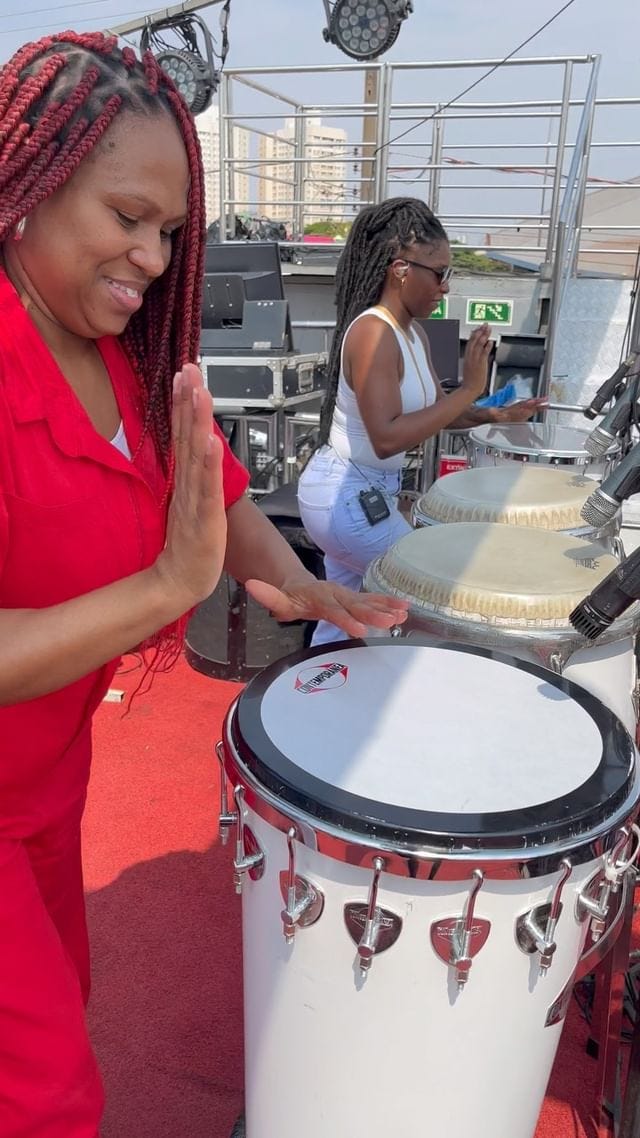Meia Volta #10: The Guardian of Brazilian Harmonica, Must-Listen Soap Opera Soudtracks, and Anitta's Latest Clip
Painting a Fuller Picture of Brazilian Music
Hiya!
Beatriz Miranda and Ted Somerville here. It’s been a longer while this time, but… we are back!
And welcome to Issue #10 of Meia Volta, the first newsletter to bring the nuances of Brazilian music they don’t tell you about 👌
In this issue…
An exclusive interview with samba jazz legend and Brazilian harmonica guru Mauricio Einhorn, a listicle on our favorite soap opera soundtracks, some of the fresh Brazilian music news, and more!
Bora lá? :)
“I Believe in God, But My Religion is Music”
Q&A with Mauricio Einhorn

More than the raison d’être of his path into music, the harmonica is part of Einhorn’s history even before he was born. As self-taught harmonica players, his Polish parents met in the early 1900s thanks to the instrument, influencing Einhorn to start playing it as early as 5 years of age. As he dove deep into the harmonica, Einhorn’s acute harmonic sensibility, thirst for knowledge, and exchange with musicians from his time (from Tom Jobim to Barney Kessel to Toots Thielemans) opened new horizons for him. Today, Mauricio is acknowledged as the most important name in the Brazilian harmonica tradition and one of the only remaining artists who have actively participated and helped shape the Bossa Nova and Samba Jazz music in Rio de Janeiro. Having recently turned 92 and still active, Einhorn celebrates the privilege of having music as a “medicine for the soul.”
Below is an edited version of our exclusive interview with him:
Meia Volta - How did music come into your life?
Mauricio Einhorn - My interest is too curious. When I first heard music, it was through my parents' harmonicas. At the age of five, I started asking my father to buy records, which I still have there today.
Well, I started listening to music from around the world. Before Moacir Santos [renowned Brazilian composer and music educator] was my music teacher, I was my own music teacher, such was the exaggerated interest I had in it.
One of the eight ensembles I was a part of, and one of the first, was the Broadway Boys. Then, I participated as a freshman in every program. Playing choro, playing regional music,... all of these styles long before bossa nova.
MV - And when exactly did jazz involve you, to the point of having such a big place in your production? And how does this connect with your affinity for musical improvisation?
ME - I am, modesty aside, a jazz encyclopedia. I was at the Hotel Plaza, and met Luiz Eça, Johnny Alf, and Paulo Moura.
Paulo Moura, upon meeting me playing, commented in my ear. I improvised based on harmony, which I always assimilated much more than the melody. Harmony interested me much more than melody. I tried to explain to myself - how did I improvise if I hadn't taken harmony lessons? I didn't study piano.
I made my flourishes without knowing how I had this technique. My interest outweighed my curiosity to know why. Without even knowing that this improvisation thing is very present in jazz too. But when I started listening to jazz, there was a eureka in my head called Les Thompson, a harmonica player. I heard him playing "Over the Rainbow" with improvisation.
MV - And how did you get closer to samba and samba jazz?
ME - Before Bossa Nova, I already listened to samba. One of my sources to train from was Dante Santoro, with his regional in 1942, on Rádio Nacional in Rio de Janeiro. I listened to Ernesto Nazaré, Zequinha de Abreu. "Tico Tico no Fubá", "Brasileirinho", "Carioquinha", "Pedaçinho do Céu", "Aquarela do Brasil", by Ary Barroso. "Sing Brazil". All of this was my repertoire before Bossa Nova.
MV - And you were one of the musicians who frequented the Hotel Plaza bar at a time when new sounds were developing in that space - especially through the pianist and composer Johnny Alf. What attracted you to start going there?
ME - At the time, my parents didn't want me to be a professional musician - and I disobeyed. Two friends took me to the Bar at the Hotel Plaza, in Copacabana. There I met Johnny Alf and Luizinho Eça, who formed a famous trio called Tamba Trio. Along with Bebeto Castilho, who would become, in the future, my partner. And Hélcio Milito, brother of pianist Osmar Milito, inventor of a percussion called "Tamba", which gave the trio its name.
And young people interested in this music began to frequent this bar. They embraced new styles of music. I was 23 years old, and Luiz Eça was around 19. Johnny Alf was born in 1929, and I was in ‘32. Then Alf was pulled away (by people interested in his music) to São Paulo, and he went to play in a place there, Baiúca, which was the equivalent of the Plaza in São Paulo. Many groups welcomed musicians and the interested public who consumed Cuba Libre, Praianinha [the cachaça label], and foreign whiskey.
MV - And you come from Jewish culture. How has this religion and cultural tradition influenced your identity?
ME - When people ask me, I say I'm Jewish second. Because my religion, first and foremost, is music. The music is unsuspecting, there is no preference. I believe in God, I'm not an atheist, but my religion is music. It's one hell of a medicine for the soul.
MV - Here at your house you have a letter from Tom Jobim, which he sent you in 1979. What was your relationship like? What was Tom Jobim like?
ME - Tom had great character. Especially with the people he resonated with. And him calling me was a huge honor. He was a giant. But with me, he was always very humble. We met at Ary Barroso's house, in one of the meetings at the beginning of Bossa Nova, around ‘58.
MV - And what were those meetings like that, in the end, gave rise to bossa nova?
ME - I attended meetings at Disa Santiago's house, whose father was Oswaldo Santiago, president and director of the Brazilian Union of Composers, UBC. Another person who held meetings at home was Nara Leão, but I didn't go because I didn't have a connection yet. The meetings were in ‘58, ‘60,... The one at Ary Barroso's house, Tom hadn't happened yet for Sinatra, it was only happening in Brazil. He was a simple guy, who liked to sing with four or five people. Among the people who attended these meetings was Beth Carvalho [famous Rio samba singer].
MV - Toots Thielemans, the Belgian jazz player, represented a great musical encounter in your life. How did this relationship begin and develop?
ME - Felix Grant, a great American radio host, who specialized in jazz, came to Brazil and attended one of my shows. We had coffee together, and he put Toots in touch with me. Felix had said that we played very similar. “He is my main influence”, I replied to him.
MV - And did you play together?
ME - Twice. Ocne in 80, in São Paulo. And another time here in Rio, in 1985.
[Mauricio Einhorn reads one of the correspondences he exchanged with Toots]: “I also wrote a bossa nova. Of course, I cannot play the authentic way. Your fellows play jazz with bossa nova. Ah, your fellows play jazz with a Bossa Nova feel, I play Bossa Nova with a jazz feel.
MV - And you also met Barney Kessel here in Rio. How was that?
ME - He was here at home. Sebastião Tapajós [Brazilian guitarist and composer from Pará State] and I played at the same festival as Barney, in Europe. He is the most well-rounded because he simultaneously plays solos and chords together. When he was here in Rio, we picked him up at the Leme Hotel, nearby. We walked here, and Claudette [Mauricio’s wife] prepared a barbecue for him. Then Tião and I played for him. He said something like, "You two playing, guitar and harmonica- it was the most noble thing I've ever heard in my life."
MV - Which other musical artists influenced you?
A guy who is my idol is Charlie Parker. For me, he surpassed Chopin - who was an improviser, but in classical music. Sebastian Bach too. Debussy - who was a romantic, he was from the heart - influenced Tom Jobim. He influenced me and most of the musicians who made Bossa Nova.
MV - What is the most valuable thing being 92 years of age has given you?
ME - I think the good things in life are making friendships, good humor, and optimism. Taking things in stride. Life is an eternal school, a succession of facts that are life lessons.
BRAZILIAN MUSIC NEWS
As Rio Grande do Sul State faces its worst socioenvironmental crisis due to the recent devastating floods, Brazilian music artists have organized live streams and festivals to raise funds for the affected population (around 626k people remain displaced from their homes). One of them, the festival “Salve o Sul” (Save Southern Brazil), organized by Rio Grande do Sul pop singer Luísa Sonza and Rio de Janeiro music producer Pedro Sampaio, takes place in São Paulo this weekend. In Rio de Janeiro, Circo Voador will host a fundraising festival on June 13 featuring indie and established music names.
And have you seen Anitta’s latest music video, “Aceita”? Depicting the rituals and traditions of candomblé (an Afro-Brazilian religion) to affirm her identity and where she comes from, the video has been the target of discriminatory attacks and, according to Anitta, made her lose around 200k followers on Instagram. The backlash, researchers and Anitta herself say, reflects the religious racism that has systematically stigmatized Afro-Brazilian cults throughout history.
And speaking of Anitta, she recently participated in Jay Shetty’s “On Purpose” podcast, talking about mental health, career, spirituality, and… taxing wealth 👀
LIST: BEATRIZ’ FAVORITE SOAP OPERA SOUNDTRACKS
Due to the growing popularity of the internet and decreasing television audience, Brazilian soap operas no longer create the buzz they used to since the first decade of the 2000s or so. Some of them, however, remain unforgettable, particularly for their soundtracks ❤️
Below are the playlists of three worth-listening soap opera soundtracks we recommend. Bias disclaimer: Beatriz is passionate about them :)
“Renascer” (2024)
“Pantanal” (2022)
“Tieta” (1989)
AWESOME BRAZILIAN MUSIC CLIPS WE CAME ACROSS LATELY
That’s all for now, gente! Hope you enjoyed the read, and see you soon for Issue #11 💫




